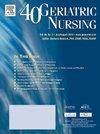巴基斯坦多病老年人与健康相关的生活质量因果模型 (HRQL-OPM)。
IF 2.4
3区 医学
Q3 GERIATRICS & GERONTOLOGY
引用次数: 0
摘要
目的:在患有多种疾病的老年人(OP)中,与健康相关的生活质量(HRQOL)低下的现象很普遍。本文提出了一个模型来研究不同因素如何影响老年人的健康相关生活质量:参与者包括 410 名年龄≥ 60 岁、患有多种疾病的住院老年人。结构方程模型评估了各因素与 HRQOL 之间的假设关系:日常生活活动(ADLs)和社会支持与 HRQOL 直接相关,而症状负担、社会支持和抑郁症状则通过 ADLs 作为中介与 HRQOL 间接相关。模型拟合度非常好(CMIN/DF = 4.23;TLI = 0.93;CFI = 0.96;RMSEA = 0.08):要达到最佳的 HRQL-OPM 需要在减轻抑郁症状和症状负担的同时加强社会支持和改善日常活动能力。ADL和社会支持最终决定了个人的 HRQOL 水平。研究结果表明,有必要了解应对多病的患者需要什么样的日常活动和社会支持方式。本文章由计算机程序翻译,如有差异,请以英文原文为准。
A Causal Model of Health-related Quality of Life Among Pakistani Older Persons with Multimorbidity (HRQL-OPM)
Objectives
Poor health-related quality of life (HRQOL) is common among older persons (OP) with multimorbidity. A model is proposed to examine how different factors influence HRQL-OPM.
Methods
Participants included 410 hospitalized OP ≥ 60 years with multimorbidity. Structural equation modeling assessed hypothesized relationships between factors and HRQOL.
Results
Activities of daily living (ADLs) and social support were directly related to HRQOL, while symptom burden, social support and depressive symptoms had indirect associations with HRQOL via ADLs as a mediator. Model fit was excellent (CMIN/DF = 4.23; TLI = 0.93; CFI = 0.96; RMSEA = 0.08).
Conclusion
Achieving optimum HRQL-OPM requires alleviating depressive symptoms and symptom burden while enhancing social support and improving ADLs. Ultimately, ADLs and social support determines an individual's level of HRQOL. Findings suggest the need to understand what kind of ADLs and ways of social support are required by those coping with multimorbidity.
求助全文
通过发布文献求助,成功后即可免费获取论文全文。
去求助
来源期刊

Geriatric Nursing
医学-护理
CiteScore
3.80
自引率
7.40%
发文量
257
审稿时长
>12 weeks
期刊介绍:
Geriatric Nursing is a comprehensive source for clinical information and management advice relating to the care of older adults. The journal''s peer-reviewed articles report the latest developments in the management of acute and chronic disorders and provide practical advice on care of older adults across the long term continuum. Geriatric Nursing addresses current issues related to drugs, advance directives, staff development and management, legal issues, client and caregiver education, infection control, and other topics. The journal is written specifically for nurses and nurse practitioners who work with older adults in any care setting.
 求助内容:
求助内容: 应助结果提醒方式:
应助结果提醒方式:


